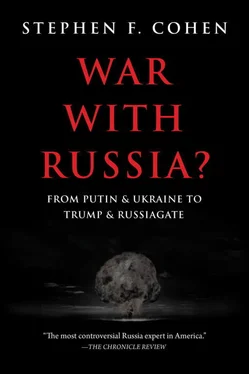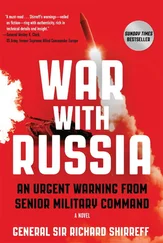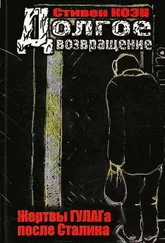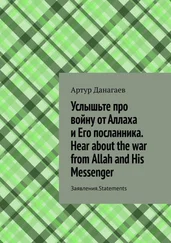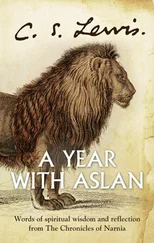The perils and costs of another prolonged Cold War will afflict our children and grandchildren. If nothing else, this reckless policy, couched even at high levels in a ritualistic demonizing of Putin, is already costing Washington an essential partner in the Kremlin in vital areas of US security—from Iran, Syria, and Afghanistan to efforts to counter nuclear proliferation and international terrorism.
But we ourselves are partially to blame for the one-sided, or nonexistent, public debate. As I said, we are not organized. Too often, we do not publicly defend each other…. And often we do not speak boldly enough. (We should not worry, for example, as do too many silent critics, if our arguments sometimes coincide with what Moscow is saying. Doing so results in self-censorship.)
Some people who privately share our concerns—in Congress, the media, universities, and think tanks—do not speak out at all. For whatever reason—concern about being stigmatized, about their career, personal disposition—they are silent. But in our democracy, where the cost of dissent is relatively low, silence is no longer a patriotic option.
We should, however, exempt young people from this imperative. They have more to lose. A few have sought my guidance, and I always advise, “Even petty penalties for dissent in regard to Russia could adversely affect your career. At this stage of life, your first obligation is to your family and thus to your future prospects. Your time to fight lies ahead.” Not all of them heed my advice.
Finally, in connection with our struggle for a wiser American policy, I have come to another conclusion. Most of us were taught that moderation in thought and speech is always the best principle. But in a fateful crisis such as the one now confronting us, moderation for its own sake is no virtue. It becomes conformism, and conformism becomes complicity.
I recall this issue being discussed long ago in a very different context—by Soviet-era dissidents when I lived among them in Moscow in the 1970s and 1980s…. A few people have called us “American dissidents,” but the analogy is imperfect: my Soviet friends had far fewer possibilities for dissent than we have and risked much worse consequences.
Nonetheless, the analogy is instructive. Soviet dissidents were protesting an entrenched orthodoxy of dogmas, vested interests, and ossified policy-making, which is why they were denounced as heretics by Soviet authorities and media. Since the 1990s, beginning with the Clinton administration, exceedingly unwise notions about post-Soviet Russia and the political correctness of US policy have congealed into a bipartisan American orthodoxy. The natural, historical response to orthodoxy is heresy. So let us be patriotic heretics, regardless of personal consequences, in the hope that many others will join us, as has often happened in history.
I turn now, in my capacity as a historian, to that orthodoxy. The late Senator Daniel Patrick Moynihan famously said: “Everyone is entitled to his own opinions, but not to his own facts.” The US establishment’s new Cold War orthodoxy rests almost entirely on fallacious opinions. Five of these fallacies are particularly important today.
Fallacy No. 1: Ever since the end of the Soviet Union in 1991, Washington has treated post-Communist Russia generously as a desired friend and partner, making every effort to help it become a democratic, prosperous member of the Western system of international security. Unwilling or unable, Russia rejected this American altruism, emphatically under Putin.
Fact: Beginning in the 1990s with the Clinton administration, every American president and Congress has treated post-Soviet Russia as a defeated nation with inferior legitimate rights at home and abroad. This triumphalist, winner-take-all approach has been spearheaded by the expansion of NATO—accompanied by non-reciprocal negotiations and now missile defense—into Russia’s traditional zones of national security, while excluding Moscow from Europe’s security system. Early on, Ukraine and, to a lesser extent, Georgia were Washington’s “great prize.”
Fallacy No. 2: There exists a “Ukrainian people” who yearn to escape centuries of Russian influence and join the West.
Fact: Ukraine is a country long divided by ethnic, linguistic, religious, cultural, economic, and political differences—particularly its western and eastern regions, but not only those. When the current crisis began in late 2013, Ukraine was one state, but it was not a single people or a united nation. Some of these divisions were made worse after 1991 by a corrupt elite, but most of them had developed over centuries.
Fallacy No. 3: In November 2013, the European Union, backed by Washington, offered Ukrainian President Viktor Yanukovych a benign association with European democracy and prosperity. Yanukovych was prepared to sign the agreement, but Putin bullied and bribed him into rejecting it. Thus began Kiev’s Maidan protests and all that has since followed.
Fact: The EU proposal was a reckless provocation compelling the democratically elected president of a deeply divided country to choose between Russia and the West. So too was the EU’s rejection of Putin’s counterproposal for a Russian-European-American plan to save Ukraine from financial collapse. On its own, the EU proposal was not economically feasible. Offering little financial assistance, it required the Ukrainian government to enact harsh austerity measures and would have sharply curtailed its longstanding and essential economic relations with Russia. Nor was the EU proposal entirely benign. It included protocols requiring Ukraine to adhere to Europe’s “military and security” policies—which meant in effect, without mentioning the alliance, NATO. Again, it was not Putin’s alleged “aggression” that initiated today’s crisis but instead a kind of velvet aggression by Brussels and Washington to bring all of Ukraine into the West, including (in fine print) into NATO.
Fallacy No. 4: Today’s civil war in Ukraine was caused by Putin’s aggressive response to the peaceful Maidan protests against Yanukovych’s decision.
Fact: In February 2014, the radicalized Maidan protests, strongly influenced by extreme nationalist and even semi-fascist street forces, turned violent. Hoping for a peaceful resolution, European foreign ministers brokered a compromise between Maidan’s parliamentary representatives and Yanukovych. It would have left him as president, with less power, of a coalition reconciliation government until early elections in December. Within hours, violent street fighters aborted the agreement. Europe’s leaders and Washington did not defend their own diplomatic accord. Yanukovych fled to Russia. Minority parliamentary parties representing Maidan and, predominantly, western Ukraine—among them Svoboda, an ultranationalist movement previously anathematized by the European Parliament as incompatible with European values—formed a new government. Washington and Brussels endorsed the coup and have supported the outcome ever since. Everything that followed, from Russia’s annexation of Crimea and the spread of rebellion in southeastern Ukraine to the civil war and Kiev’s “anti-terrorist operation,” was triggered by the February coup. Putin’s actions were mostly reactive.
Fallacy No. 5: The only way out of the crisis is for Putin to end his “aggression” and call off his agents in southeastern Ukraine.
Fact: The underlying causes of the crisis are Ukraine’s own internal divisions, not primarily Putin’s actions. The essential factor escalating the crisis has been Kiev’s “anti-terrorist” military campaign against its own citizens, mainly in Luhansk and Donetsk. Putin influences and no doubt aids the Donbass “self-defenders.” Considering the pressure on him in Moscow, he is likely to continue to do so, perhaps even more directly, but he does not fully control them. If Kiev’s assault ends, Putin probably can compel the rebels to negotiate. But only the Obama administration can compel Kiev to stop, and it has not done so.
Читать дальше
